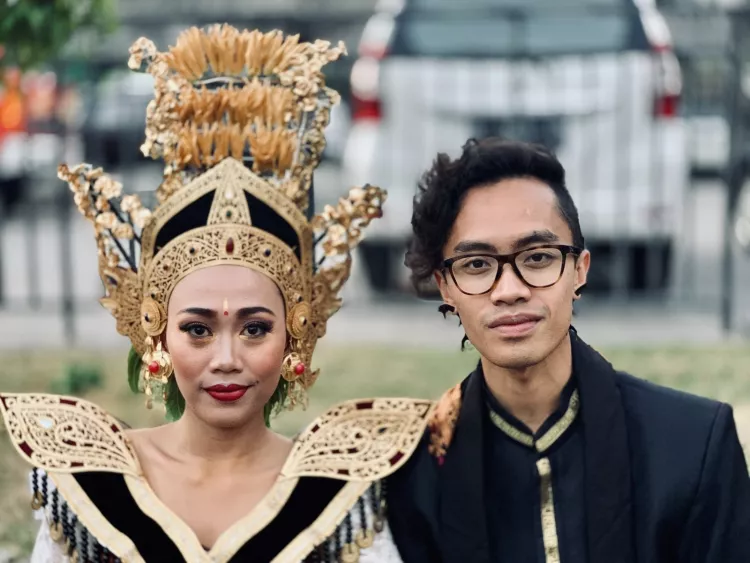Gamelan Semara Santi's Fall 2023 Performance

Music Program Featured Artists Putu Tangkas Adi Hiranmayena and Dewa Ayu Eka Putri
For 25 years, Gamelan Semara Santi — a classical Indonesian percussion orchestra — has been a fixture of Swarthmore College’s music department. Throughout that history, co-director and professor Tom Whitman ‘82 has dreamed of putting together one piece: “Condong”, a complex Balinese dance used as a preface for a longer performance called "Legong". Now, thanks to visiting artist duo Putu Tangkas Adi Hiranmayena and Dewa Ayu Eka Putri, the Gamelan ensemble will perform “Condong” for the Swarthmore community on Nov 19 in Lang Music at 3 p.m.
Putri — a Balinese artist-anthropologist and Lecturer of Dance at Grinnell College — has laid the foundation for Gamelan Semara Santi to perform the complex piece together with their long-time partner, the Indonesian Cultural Club of Delaware. Putri, who has been dancing since a young age, works to combine traditional gamelan with more contemporary movement. Hiranmayena — an Indonesian artist-scholar and Assistant Professor of Music and director of the Balinese Sound Ensemble at Grinnell College — has combined tradition with experimentation including heavy metal and improvisation. At Swarthmore, he’s excited to encourage students to try new things through the traditional form of gamelan.
“I grew up with gamelan in colleges, universities, and community groups,” Hiranmayena said. “Because I was afforded small opportunities to uphold my Indonesian identity across oceans, I found ways to critique those cultural idioms and interrogate ideological problems. This led me to find experimental practices and music on the margins.”
Swarthmore’s gamelan, according to Whitman, is a forgiving environment partly because of the music’s cyclical nature, which gives musicians many opportunities to refine their playing. Gamelan is notation-free and often taught orally. Students learn percussion instruments spatially through right and left thinking, or can develop individualized notations based on what makes sense to them personally. Whitman says this can initially make students uncomfortable, but developing personalized systems of learning is a skill you can take from the arts and employ in many aspects of life.
“It [gamelan] is a very forgiving environment for learning, and I think that's something that can transfer to other environments too,” Whitman said. “I think the performing arts are a great place to learn how to stand up in front of a group of people and take a risk. Sometimes it'll work and sometimes it won't work but it strengthens you to be able to [take risks] in the arts and other areas.”
Whitman believes gamelan, generally and at Swarthmore, provides an avenue for community expression. By bringing together students, faculty, community members, and now guest professionals, Gamelan Semara Santi creates an inclusive environment honoring culture and tradition. For Putri, whose research background is in anthropology, dance serves as a history of past communities.
“In dance anthropology, we not only learn about movement techniques, but explore the history and reasons why dance was born in a particular place,” Putri said. “In this fast-paced and progressive world, I feel that anthropology can be a basis and reminder for humans of their connections to each other and the environment in which they live.”
Gamelan is part of a much larger department initiative to diversify beyond a Eurocentric classical music focus. Whitman’s own Swarthmore music training as an undergraduate was in European classical music, but his “life was changed” as a Luce Scholar in Bali. Returning to Swarthmore in 1990 and inspired by his travels, Whitman formed Gamelan Semara Santi with co-Director I Nyoman Suadin. Despite his scholarship and years of teaching, Whitman says he still feels like an “advanced beginner,” a position he views as healthy.
“When I started teaching at Swarthmore in 1990, the model was that the professor is the most knowledgeable person in the room,” Whitman said. “I think it's become clear to us that that was not working, especially with a more diverse student body. Teaching has to be much more interactive and involve a whole lot more listening. I think the faculty is much, much more receptive to that message now than folks were in the early 90s.”
Hiranmayena and Putri will be performing with Gamelan Semara Santi and the Indonesian Cultural Club of Delaware on Sunday, Nov. 19 at 3 p.m. in Lang Concert Hall. The concert is free and open to the public. Membership in Gamelan Semara Santi is also open to the public, regardless of musical background. All student and non-student community members interested in joining the ensemble are encouraged to reach out to Professor Whitman for more information.



